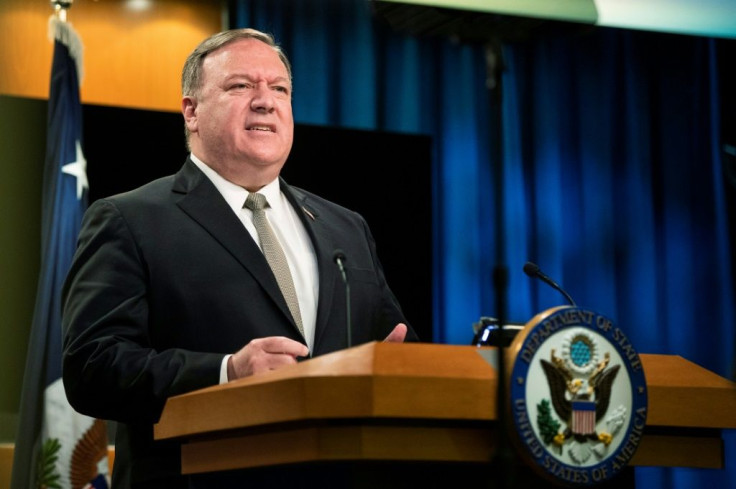Trump Official on China's Hong Kong Security Law: 'Communist Party Fears Its Own People'
KEY POINTS
- China implemented a new National Security Law, which led to thousands protesting on the streets of Hong Kong
- Following the protests, over 300 were arrested. Nine persons were specifically arrested for reportedly violating the new law
- Referring to the arrests, Mike Pompeo said, "the Chinese Communist Party fears its own people"
The United States Secretary of State Mike Pompeo discussed many topics during a Wednesday (July 1) press conference held in the White House press briefing room. The first on the list was the National Security Law that went into effect a day earlier in Hong Kong.
“Yesterday the Chinese Communist Party implemented its draconian national security law on Hong Kong, in violation of commitments that it made to the Hong Kong people and to the United Kingdom, in a UN-registered treaty – and in contravention of Hong Kongers’ human rights and fundamental freedoms,” Pompeo said.
The law, implemented by China, has 66 articles that will criminalize certain acts like secession, subversion, and collusion with foreign governments. It also restricts their right to freedom of speech and to protest.
“Free Hong Kong was one of the world’s most stable, prosperous, and dynamic cities. Now, it will be just another communist-run city, where its people will be subject to the party elite’s whims. It’s sad,” the secretary of state stressed.
Over 300 people were arrested from among the thousands protesting the law on Wednesday. Nine demonstrators were specifically arrested for reportedly violating the new law.
“Security forces are already rounding up Hong Kongers for daring to speak and think freely. The rule of law has been eviscerated. And as always, the Chinese Communist Party fears its own people more than anything else,” Pompeo said, referring to the arrests.
The laws, taken at face value, might be written into legislation by any free country as it makes secession, subversion, terrorism, and collusion with foreign forces a criminal act with penalties as severe as life in prison. The penalty in the U.S. for anyone convicted of high treason is life in prison.
But compared to the U.S., the Chinese Communist Party enforces its security laws differently:
- Putting restrictions on the freedom to protest and freedom of speech, which are basic rights in the U.S.
- Punishing those who express anti-Chinese government sentiments. Many media outlets in the U.S. are critical of their government
- During the press conference, Pompeo warned Article 38 of the new security law could impact outsiders including Americans as it says “offenses committed outside of Hong Kong by non-residents of Hong Kong” are also now punishable
Pompeo, describing the U.S. response, said visa restrictions on those responsible for the Hong Kong crackdown and implementation of President Donald Trump’s directive to end Hong Kong’s special status would continue. He added defense equipment and dual-use technology of U.S. origin going to the territory has already ended.
At the top of any list about Chinese law enforcement is the human rights abuses committed by China. “Today, the United States Department of State, along with Treasury, Commerce, and DHS, are issuing a business advisory to companies with supply chain links to entities complicit in forced labor and other human rights abuses in Xinjiang and throughout China. We’re also continuing to take action to build on President Trump’s signing of the Uyghur Human Rights Policy Act," Pompeo said.
He went on to mention China’s decision to bring trumped-up espionage charges against Canadians Michael Kovrig and Michael Spavor, supposedly in retaliation for Canada’s arrest of Meng Wanzhou, a Huawei’s executive charged by the Department of Justice with bank fraud, wire fraud, and conspiracy to commit bank and wire fraud.
Before he moved on to other issues and answering questions, Pompeo urged nations and human rights groups to take action against human rights abuses.

© Copyright IBTimes 2024. All rights reserved.




















